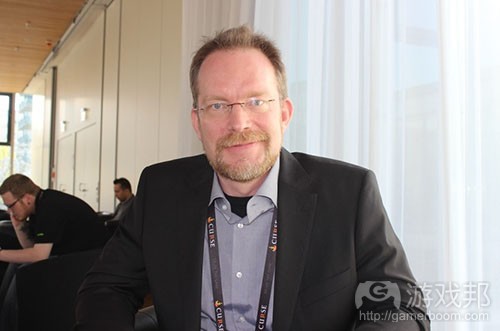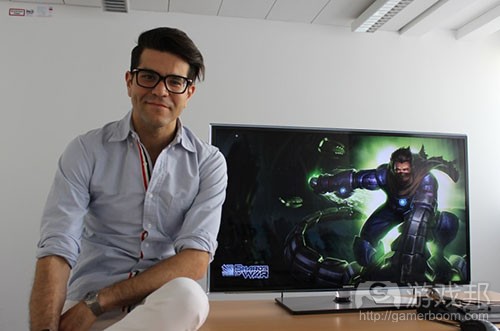阐述德国游戏行业现状及发展空间
作者:Dean Takahashi
德国并非表现最卓越的游戏市场,但它却孕育了一些杰出的游戏公司。幸运的话,它们或许有天也会像德国啤酒一样驰名世界。
我是在参加柏林Quo Vadis游戏开发者大会期间意识到这一点。在这段时间我发现德国游戏行业所遭遇的成长之痛与美国游戏公司并无二致,但它仍然存在潜力,因为它创造了一些有利的发展条件。
这个国家游戏行业的崛起离不开创业者的努力和政府的一些支持。德国为初创企业提供了小额财政补贴,减税等政,以及一些创业建议和发展空间。但最重要的是,游戏领域在此还只是一个草根行业。新兴公司青睐这个国家较为低成本和丰富的科技人才(游戏邦注:这包括来自世界各地的人才)。
柏林国际游戏周集合了许多你在美国无法看到的现象。今年的Quo Vadis有2500名注册参与者(去年是400名),观众不时穿梭于其他展会和场所,所以并未出现人潮涌动的火爆场面。但这些展会之间呈现的是友好型而非竞争性的情况。
柏林官方可能会说自己的城市是欧洲最棒的游戏中心,但无数来自其他城市的人可能会发现,柏林的游戏从业者远少于汉堡,科隆和其他地区。
所有的德国游戏中心都在崛起。据德国政府相关部门数据显示,从2004年到2013年,德国游戏开发者和发行商工作职位已从6938个增长至10230个。
这些游戏公司的收益每年增幅达14%。据Quo Vadis组织者Stephan Reichart所称,如果算上用户获取和营销技术职位,与德国游戏行业相关的职位已增长至2.5万个。远超过芬兰2600个游戏开发者岗位,但远少于美国,毕竟美国拥有大量已上市的大型游戏公司。
在这1400多家德国游戏公司中,有200家以上位于柏林,像Kabam和King这类国际发行商也在柏林设立了分支机构。而Wooga和GameDuell这种游戏开发商也位于柏林,HitFox、GameGenetics、Glispa和Fyber这种与游戏技术相关的公司也座落于此。
柏林拥有大量发展空间。其地块面积远超伦敦,但人口却只有350万,还不足伦敦(人口为800万)的一半。柏林成本开销更低,这也是King和Kabam这些公司在此设立工作室的一个原因。
但柏林和德国在某些方面还需要再接再励。由于缺乏热作,德国的游戏市场份额已经一再缩水。Supercell和Rovio分别靠《Clash of Clans》和《愤怒的小鸟》将芬兰打造成了游戏行业中的地标,King也因《Candy Crush Saga》在伦敦和瑞典享有声誉,来自硅谷的Machine Zone则推出了《Game of War:Fire Age》。
芬兰在早期注资中为Supercell提供了慷慨的支持,现在也通过税收得到了回报。美国虽然没有类似的补贴政策,但当地的风投对游戏公司的融资支持由来已久。
与美国不同的是,德国并没有一个大型娱乐产业。德国政府为电影行业输送大量资金,但其电影却并未出现轰动全球的热作。与之形成对比的是,该国政府对游戏行业却吝于投入,部分原因是担心游戏过于暴力或容易上瘾,不利于儿童身心健康。
风投也不会向德国游戏公司注入太多资金。像Goodgame Studios这种去年创收2.2亿美元,拥有2.45亿用户的游戏公司,一直以来只能自立更生。
德国游戏市场规模约30亿美元。市场调研公司Newzoo评估称全球游戏市场规模为915亿美元。但Reichart称,德国游戏开发者和发行商在本土市场收益上只能占比7%,低于过去的11%。所以尽管德国游戏行业的工作岗位还在增长,德国游戏行业收益所占份额的增长速度却并不如其海外游戏收益份额。
只有产生热作的地方才能实现收益,King的《Candy Crush Saga》激活了一个强大的伦敦和瑞典游戏开发社区;Supercell旗下的三款热作《Clash of Clans》、《Hay Day》和《Boom Beach》也给芬兰创造了17亿美元收益。这家赫尔辛基游戏公司创造的收益超过了德国所有游戏开发商。
有一个问题在于,德国早期专注于免费模式网页在线游戏的公司(以Gameforge和Bigpoint为代表)在向手机游戏市场转型的过程中遭到挫败,而Crytek这家德国最大的主机游戏开发商及开发工具CryEngine制造商也陷入了困境。
Goodgamne Studios(位于汉堡)和Wooga(位于柏林)等德国手机游戏公司运营良好,但在全球手机游戏市场上却并非极具影响力的选手。
但热作终究会到来,余下的德国游戏公司正面向网络和手机游戏开发领域进行合作。Bigpoint首席执行官Khaled Heioui指出,Bigpoint有5款游戏正在开发阶段,远少于其过去的开发数量,因为它现在专注于质量更高的产品。
Helioui表示,“对德国来说过去两年确实比较艰难。”
Reichart称部分原因在于德国市场本身已经足够本地开发者进行开拓。Quo Vadis在从德语转向英语对话之前已经有9年的布展历史,“这是德国的一个典型问题,你不得不强迫德国人去考虑海外市场。我们是免费模式市场上的先锋,我们得保持这个地位。如果我们丧失这个地位,我们德国的一些真正成功的公司也终会被收购或消失。”
与之形成对比的是,芬兰的国内市场却非常小,但Supercell却能够从创业之初就考虑到海外市场。不过德国尤其是柏林也在发生变化,成功吸引了许多来自其他地区的游戏开发者。Wooga公司的250多名成员中就分布着40多种不同的国籍。
Wooga首席执行官Jens Begemann表示,在德国前30名企业中,并没有一家来自柏林。这意味着柏林并不会因拥有人员众多的大型公司而繁荣发展,柏林必须以其他途径创造工作岗位。“柏林必须通过创业公司实现发展,我们得寻找其他地区的人才并将他们引向柏林。好在他们也愿意来柏林。他们不需要懂德语就能来这里。”
本土与海外员工混合办公的理念很不错。Glispa首席营销官以及每月都会访问柏林的美国人Nicole Demeo表示,德国公司很可靠,但它们需要一些营销方面的帮助。而这方面的人才也在逐渐转向柏林。
她称这里有一个真正的外来者社区,“虽然还需要一些成长时间,但柏林的初创公司社区真的很强大。”(本文由游戏邦编译,转载请注明来源,或咨询微信zhengjintiao)
The DeanBeat: Germany is still on the cusp of gaming greatness
Dean Takahashi
BERLIN — Germany isn’t the biggest player when it comes to gaming, but it is brewing some game companies that, with luck, will one day be better known than the country’s beer.
I saw this as I visited Berlin’s Quo Vadis game developer event, which was just one of 11 different happenings related to gaming and tech during the week. As I toured around briefly, I felt like Germany had some growing pains that I’ve seen before at companies in the U.S. But it also has potential, because it is creating some of the right conditions for good things to happen.
Stephan Reichart of Quo Vadis
The impressive thing about the Central European nation’s rise in gaming is that it’s a product of entrepreneurship and a little bit of government support. Germany supplies a small amount of financing, tax breaks, advice, and space for startups. But mostly, it’s a bootstrapped industry. Fledgling companies like the region’s low costs and maelstrom of tech talent (which includes many expats from all over the world). But it’s really a long-held passion for games that keeps it all going, said Handy Games chief executive Chris Kassulke, a Wuerzburg, Germany-based studio that has worked in mobile for 15 years.
The International Games Week Berlin — a mini-version of the huge Gamescom event in Cologne, Germany, every August — is a kind of collaboration that you would never see in the United States. Quo Vadis itself had about 2,500 registrations, up 400 from a year ago. Its audience was spread thin among the other events and venues. But these showcases are friendly, not competitive, toward each other.
Berlin officials would like to argue that their city is the best gaming hub in Europe. But numerous folks from outside of the city noted that it has a smaller population of gaming employees than Hamburg, Cologne, and other locales.
All of Germany’s various game hubs are on the rise. From 2004 to 2013, the number of game developer and publisher jobs in Germany grew from 6,938 to 10,230, according to Elmar Giglinger, the chief executive of the German government’s Medienboard Berlin-Brandenburg, the regional government entity that deals with the film and media industries.
Revenue among these game companies has risen 14 percent per year. And if you count user acquisition and marketing tech, the number of industry-related jobs rises to 25,000, said Stephan Reichart, the organizer of Quo Vadis. That’s a lot more than Finland’s job base of 2,600 game developers, and a lot less than the U.S., which has big publicly traded game companies.
Of the 1,400-plus German game companies, more than 200 are based in Berlin, and international publishers such as Kabam and King have set up branches in the capital. Game makers such as Wooga and GameDuell are based in Berlin, as are gaming tech-related firms such as HitFox, GameGenetics, Glispa, and Fyber.
Berlin has a lot of room to grow. It has much more land mass than London, but it has a population of just 3.5 million, or less than half of London’s 8 million. Costs are low, prompting companies such as King and Kabam to set up offices in the region.
But Berlin and Germany have a long way to go in some respects. Germany’s historical market share of the gaming business has fallen as the big hits are produced elsewhere. Supercell and Rovio have put Finland on the map with Clash of Clans and Angry Birds. King has big hubs in London and Sweden thanks to Candy Crush Saga. And Machine Zone has its hubs in Silicon Valley thanks to Game of War: Fire Age.
Finland gave generous support to Supercell with early financing, and now it’s reaping the reward from tax collections. The U.S. doesn’t have similar subsidies, but it has a long history of funding game companies through venture investments.
Unlike the U.S., Germany doesn’t have a big entertainment industry. The German government pumps a huge amount of money into films, but the movies aren’t global blockbusters. By comparison, it has pumped scant money into games, partly out of the politically driven concern that they’re bad for kids, too violent, or too addictive.
Venture investors don’t pour tons of money into games in Germany. Companies such as Goodgame Studios, which had $220 million in revenues last year and 245 million users, grew without such funding.
Germany’s game market is around $3 billion. And market research firm Newzoo estimates that the overall game market is $91.5 billion. But German game developers and publishers themselves only hold about 7 percent of their home market, said Reichart. That is down from 11 percent in the past. So, while the number of German game industry jobs has grown, German share of the industry revenues has not grown as fast as foreign share of Germany’s game revenues.
“We need to stand as an industry and get back to where our market share was in the past,” he said.
The money is where the hits are, and King’s Candy Crush Saga fuels a strong game development community in London and Sweden. And Supercell’s hits — Clash of Clans, Hay Day, and Boom Beach — brought $1.7 billion in revenues to Finland. That single Helsinki game generates more revenue today than all of Germany’s game developers.
One of the problems is that Germany’s early focus on free-to-play browser-based online games — pioneered by companies such as Gameforge and Bigpoint — took a big hit in the transition to mobile gaming. Crytek, the biggest console game developer and maker of the CryEngine, also fell on hard times.
Germany’s mobile game companies such as Hamburg’s Goodgame Studios and Berlin’s Wooga are doing well, but they aren’t the biggest kids on the block when it comes to the global mobile gaming market.
Khaled Helioui, CEO of Bigpiont.
The hits will come, as the remaining German game companies are consolidating and doubling down on online and mobile game development. Hamburg’s Bigpoint has just five games under development, a lot fewer than it has had in the past, as it focuses on higher quality, said Khaled Helioui, chief executive of Bigpoint, in an interview with GamesBeat at its Berlin office.
“It’s been a hard couple of years for Germany,” Helioui said.
Reichart said that part of the problem is that the German market itself has been big enough for local developers to target it. The Quo Vadis conference went on for nine years before it switched from German to English-language talks.
“That’s a typical problem in Germany, where you have to force the Germans to think beyond the German market,” Reichart said. “We were pioneers in free-to-play, and we have to keep this position. If we lose this position, the few really successful companies we have in Germany will be bought or disappear.”
By comparison, Finland is so small as a domestic market that Supercell had to think about being global from day one. The thing that is changing is that Germany, particularly Berlin, is having great success attracting game developers from other regions. Wooga has 40 different nationalities among its 250-plus member staff.
Jens Begemann, CEO of Wooga.
Above: Jens Begemann, the CEO of Wooga.
Jens Begemann, the chief executive of Berlin’s mobile gaming company Wooga, told me that of the top 30 German corporations, none are based in Berlin. That means that the region doesn’t prosper because it has giant companies that employ tons of people. Rather, Berlin has to create jobs in other ways.
“Berlin has to grow through its startups,” Begemann said. “And we have to find talent from other places and bring them to Berlin. The good thing is they are willing to come. This is a place where they can get by without knowing a word of German.”
The mixture of local and foreign employees is good. The transplants should bring more creativity to Germany than it has historically had. Nicole Demeo, the chief marketing officer at Glispa and an American expat who visits Berlin a couple of times a month, said that German companies are solid, but they need help with marketing themselves. And slowly, that talent is relocating to Berlin.
“It’s a real expat community here,” she said. “It has taken some time, but Berlin’s startup community is really strong.”(source:venturebeat)
下一篇:分享让游戏设计更生动的润色技巧










































 闽公网安备35020302001549号
闽公网安备35020302001549号